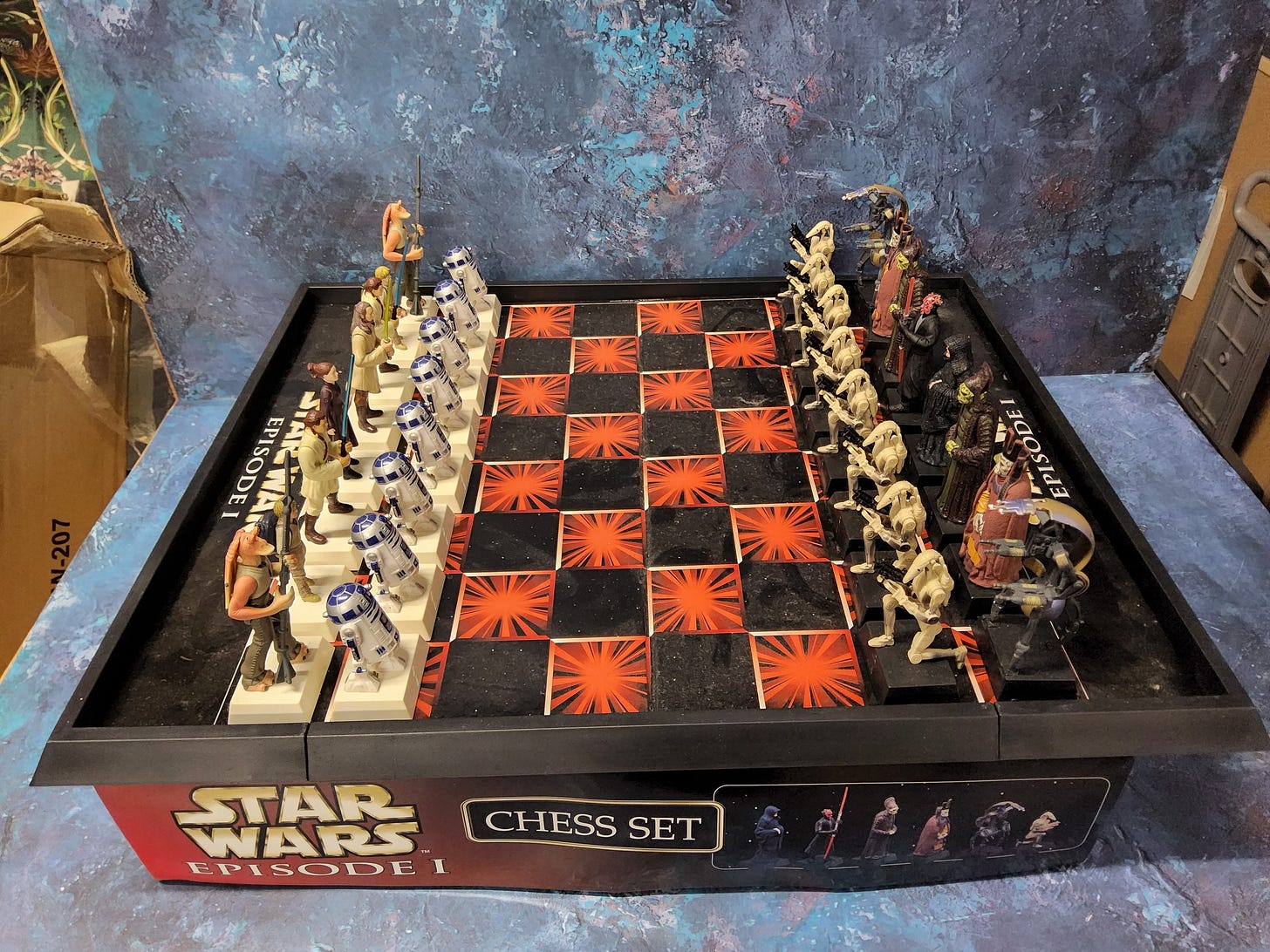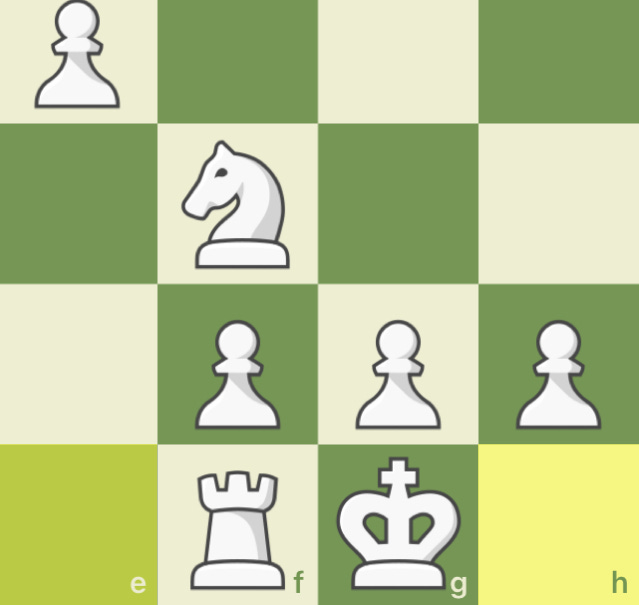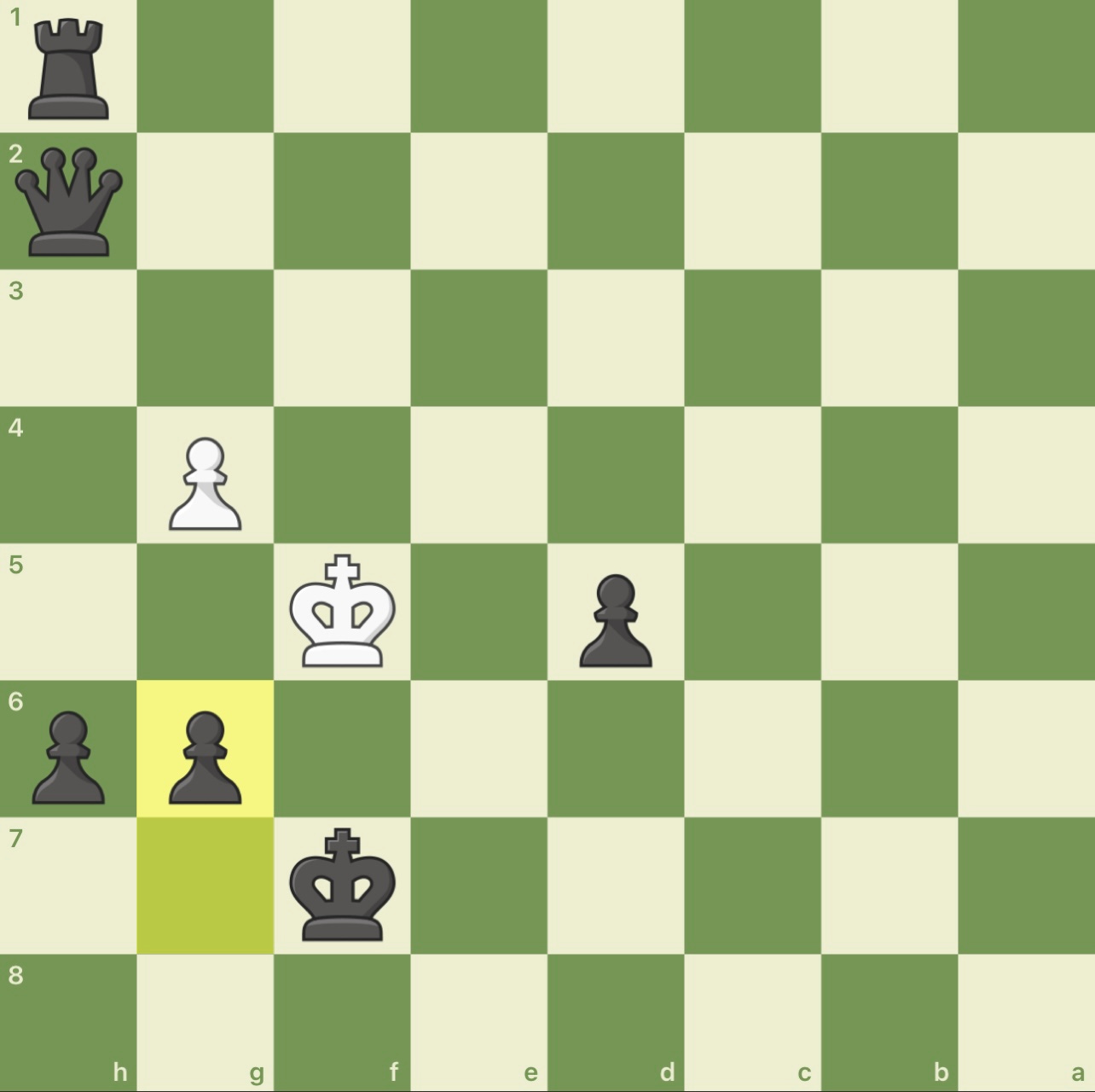Promoting Pawns
Five things my recent chess obsession remind me about parenting
I’ve always had a lingering fascination with chess. I remember from a young age owning lots of chess sets—not initially to play, but just to meticulously set up and study. I proudly placed each piece, knowing where the knights and bishops went, and knowing that the queen goes on its matching colour square, whilst the king goes on the opposite. As the saying went, the queen’s shoes must match her dress.
I vividly remember the first chess set that got me into my mild obsession. The gateway drug was my much larger obsession with Star Wars: Episode I - The Phantom Menace. The film had come out in May 1999, and in my bloodlust to devour every piece of merchandise George Lucas could pump out, I was bought this abomination of a chess set for my 9th birthday. It’s not all bad—R2D2 serves as the pawn for one side, so you get eight of the little buggers. I might have set it up for a chess game or two, but really I just used the pieces as action figures. I shudder to even think of trying to play a single move, let alone a whole game, with that monstrosity.
I progressed from staring at the board to playing one-person games where I’d always win in four moves. By then I had a few different sets; one of which was inexplicably all made of glass. Eventually I became a teenager though, and the chess sets fucked off to the attic.
It wasn’t until my mid-twenties that I started to dabble with actually playing again. I played online, and lost a lot. Whenever I played my wife, I would lose, but still have fun kamikazeing all my pieces when I decided the game was beyond saving.
That was always my trouble, I think. I’d never look beyond the next move. All my opponent needed to do was a tiny bit of forward-thinking, and they’d have me on toast. I was always keen for a game whenever a board appeared, but I always would lose. But it was years between games whenever I did play, so I didn’t think much of it.
My last two over-the-board games happened on a family trip with my in-laws. We stayed in a great holiday house with a massive games room. When we were all bored of pool and darts, a dusty chess set emerged from underneath the TV unit.
The first game was one I played against my father-in-law. I had way too many cans under my belt, considering I had two children upstairs that were ready to pounce on me at 6am, so I was hardly going to give a good account of myself anyway.
Come on Brad, I thought to myself. Remember the video lessons you did on the Chess.com app on your phone years ago at your desk when you were meant to be working. Don’t completely embarrass yourself.
Father-in-law started with moving his king’s pawn two spaces. Standard stuff.
For some reason, I moved my queen’s pawn two spaces forward—leaving it ripe for capture. Now, that technically is a legit opening move, called the Scandinavian Defence.
Did I know that? Did I fuck.
He took my pawn, I didn’t follow up with the correct next move and already I was a pawn down. The game was over before it’d started. I reverted to type, and started sacrificing pieces, just so I could end the agony of defeat and go to bed.
Our collective states of inebriation showed as our hands fumbled to put the pieces back on the board once the game was over.
“You’ve got quite an analytical mind,” he said to me, “so I thought you’d be good at chess.” A double-edged comment only an in-law can land.
The next day, I go out into the garden after getting the youngest down for her nap. There, he’s playing chess again, this time against my wife. They have a decent game, but in the end he wins. The board turns towards me, and suddenly I’m playing against my wife. She’s white, because obviously she’s always white.
I don’t blunder within two moves this time, so it’s an improvement. However, my classic impatience gets the better of me once again and I’m slowly picked apart due to my lack of foresight. She’s not as efficient at finishing me off as her old man, though. I wish she was, because I had to endure the indignity of him leaning over her shoulder, whispering, you’ve got him—you’ve done him. One move and it’s over, followed by him on more than one occasion taking a photo of the board to show my wife where she could have beaten me earlier if she’d made the right move. Aren’t in-laws fun?
After my king was well and truly cooked, once again my father-in-law makes some comment about thinking I’d be better at chess—this time, my wife agrees.
I think back to all the chess sets I owned as a kid; all the time I’d spent learning about the pieces and the moves from a fairly young age…and yet thirty years later I’m still shit at it.
It was then that I decided I’d git gud.
Fast forward three months, and my YouTube algorithm is all just chess nerds showing off their opening traps—but I’m a hell of a lot handier at chess than I used to be. I still only play correspondence games against people online—which means you’ve got a day to make each move; ideal for parents who are time-poor. The idea of playing to a proper timer still fills me with dread. But I’ve kicked the habit of sacrificing all my pieces on the altar of boredom.
One thing I picked up as I tried to cram as much information about the game into my head was that—holy shit, this is complex. It blows my mind the extent to which some of the top players in the world calculate upcoming moves—something up to twenty moves ahead. Seriously, people shouldn’t be allowed to have a brain like Magnus Carlsen has. It’s just not fair.
Plenty has stuck for me, however—and I’ve noticed a few things. Like parenting, chess is a complicated balancing act. There’s principles, tactics, strategies, and it can all turn into a complete and utter shitshow in the blink of an eye. But there’s a few things you can do in both chess and day-to-day parenting that give you the best chance of not repeatedly embarrassing yourself in front of your in-laws succeeding.
Protect the king and queen
Whilst we’re in this game to look after every piece and member of the family, self-care is essential. If the king and queen aren’t safe, you’re going to run into problems either later down the line, or very quickly.
In chess, it’s best practice to castle the king within the first ten moves. This move tucks it underneath a bed of pawns nicely, with a rook guarding the door. God it looks cosy; every time I tuck that little bastard in now, I get a bit jealous.
Whilst the queen is less vulnerable than the king—in fact, it’s the most powerful piece on the board and does most of the heavy lifting (where have I heard that before?). Yes, it can look after itself—but play it too early at your peril.
The same applies to our day-to-day lives as parents. We’re actively engaged parents here—and we can’t be that unless we look after ourselves. Take the moments whenever we can to do something that nourishes our body or soul—or just snuggle under a lovely bed of pawns.
Accept when the plan changes
Having watched so many opening chess traps on YouTube over the past few months, the temptation to try a few out myself has been too much to resist.
They all start the same way; you make some weird off-beat move, luring your opponent into an easy, lazy and obvious move. That move then turns out to have been the wrong one, and you pounce and spring a devious trap.
Like most things on YouTube however, it’s designed for cheap, throwaway engagement. Of course, too many times when I’ve tried to spring one of these traps, the opponent doesn’t play the move I want them to. Probably because the move the YouTube video said they’d play is a totally shit move that no one would ever play in real life.
What I should have done in more games than I care to admit, was accept that the plan hadn’t worked and look for a new strategy. Instead, I’d carry on waiting for that opening that would never come, playing more and more desperate moves whilst I waited. All of these games I ended up losing.
This is pretty much every day when you’ve got kids. One day you think baby has finally started sleeping through nicely—then a week later a sleep regression hits you like a steam train. Or that one meal that you could bet the house that your three-year-old would eat, suddenly might as well be laced with poison with how emphatically they reject it.
I’ve driven myself mad in the past chasing after a happy status quo that suddenly doesn’t exist. The rules of the parenting game change at such breakneck speeds sometimes—and it can be truly maddening.
But kids will be kids. Plans change—all the time. And most of the time, there’s not a damn thing we can do about it. Well, except one thing—accept it. Move with the change. Lean into it, acknowledge that it’s happened, and make a new plan.
Teamwork makes the dream work
There’s few regularly occurring scenarios where you can checkmate your opponent with a single piece. You might get lucky and find that your opponent has trapped their own king behind a line of pawns, and a single rook or queen move can spell the end of the game.
More often than not though, you’re going to need backup.
This checkmate that I got recently, for example, was only possible because of then queen, the three black pawns and the king.
I’m guilty of thinking I can do things on my own—a lot. I’ve always been a kind of introverted and socially awkward person, meaning I’d often rather struggle on my own than the indignity and crushing embarrassment of *gasp* bothering someone else for the most minor bit of assistance.
A parenting example of this is the night shift—I always put the youngest down for her naps and sleep time, and if she wakes I’ll go in first. Being the age she is, there’s plenty of fun surprise sleep regressions that pop up from time to time. For some reason, no matter how hard I try, sometimes the youngest will just not go to sleep.
The right thing to do is to tag out; admit that you’re knackered after an hour and a half of rocking the baby to no avail, and ask your other half to take over for a bit while you rest and recover.
I find it hard to ask for that help sometimes—even from my own wife, who has explicitly told me many times to come and get her if I ever need a break from rocking.
This is one facet of growth that we have to tackle head on if we want to get through parenting with our sanity still (somewhat) preserved. If you too have a hard time asking for help, you’re only setting yourself up to fail. Bite the bullet, confront what it is that makes you not feel comfortable asking for help, and then do it anyway. I’ve found that whenever I’ve managed it, the perceived backlash that my mind tells me will come if I dare to speak up never comes, and I get the help and rest I need.
Double-check your next move
This was my number one issue with how I’d play chess before. Tunnel vision would befall me as I’d spot an opportunity to capture one of the other player’s pieces. Like a greedy magpie, I’d leap at the chance to greedily nab a shiny knight or bishop, should I get the chance.
Then, all my hopes and dreams would crumble around me, as the opposition player would take a piece back immediately—or worse, discover that in moving my piece, I’d left another, more valuable piece unprotected. Bye bye queen!
Before I had a child, I was sure that I’d be a certain kind of parent—one that would never raise their voice or get frustrated with their kid. One that would always choose patience and compassion over an instinctive reaction.
Well, as we all know, that’s so much easier said than done.
Whether one of them has smeared their yoghurt in the sofa, drawn all over the wall, or piss themselves just because they thought it’d be funny1—there’s an instinctive, snappy reaction in all of us. Mostly one that our own parents would have used, and has become our own learned default.
Whenever anything like that happens, I try to make myself take a breath. Think—really actively think—about what the next move should be. Am I making a mistake here? Is there something I’ve missed? Maybe the eldest didn’t push the youngest over—maybe it was an accident.
Just a single breath has saved me on many occasions, both on the board and with the kids.
Push your pawns
One thing I quickly realised about my chess tendencies when I started to look back at games was just how little I used my pawns.
I can see why I neglected them so much. After all, they’re boring. They only move one space forward—who wants to move that?! Moving a bishop or a rook is way more fun when they can zoom across the board in a single move. Or doing fun horsey jumps with the knight.
But as I came to realised, if those little guys just sit there doing nothing whilst the bigger boys and girls take care of everything, how are they going to ever get promoted? One of the key things you want at the end of a game is to get a pawn to the other side of the board, so you can promote it into a queen. How can it fulfil its destiny if you don’t let it?
All the time, I’m realising that the same thing applies to our real life little ones. My early parenting instincts would always be to run and get whatever my daughter was asking for, to help her down from a high bit of the playground, or to literally wipe her own bum for her.
Now that she’s five, I’m making myself step back from my helicopter parent tendencies. I’m letting her figure out how to climb down from high places by herself, encouraging her that she can figure out where she left something, or trusting that she’ll put her shoes on the right feet, if she gets enough practice.
It’s a balancing act, for sure. Push a pawn too soon, and it’ll be unprotected and prime for capture. Likewise, expecting a one-year-old to wipe their own arse is a bit optimistic. It’s hard to know when one little pawns have crossed the threshold that lies betwixt needing us to help them and needing us to push them. The best thing we can do is pay attention to their own cues; take their lead.
Of course however, pawns on a chessboard can’t talk. This analogy is crumbling before my very eyes. I can’t believe I managed to get a whole issue out of this.
Whether or not you like chess, however, these are often guiding principles that are easy to lose sight of in the whirlwind of day-to-day parent life. Any little idioms or analogies that help you keep sight of the mantras, and that get you through the day, are worth holding onto.
What’s your number one parenting mantra?
Gosh, that was way longer than I thought it’d be. Thank you for sticking with me until the end!
There’s five parenting mantras to live by—but what’s the one that gets you through the days? What single guiding principle would you bestow to a new parent, should they ask you?
Previously on Some Other Dad
I'll Handle It, Thanks Very Much
Why it's not OK to discipline someone else's child, and why I'm a massive hypocrite
All three, in the same day. We don’t talk about it anymore.









I think it speaks to the dismal state of my chess knowledge, but I learnt a lot about chess from that. I need to learn, my 7 year old has taken a recent interest in chess. I guess I'll be thinking things like "self care my king" and "let the pawn wipe it's own bum" next time he asks me to play
such a great correlation with the pawns to allowing children to find their own paths in life.
(And that chess set looks significantly worse in real time than the original link. At first, I blamed Jar Jar... But the more I looked at it, the worse it got. But, the mayhem of episode 1 merch was very alive in my house as well. Begged my mom do several trips to KFC to get all of the collectible cups...)